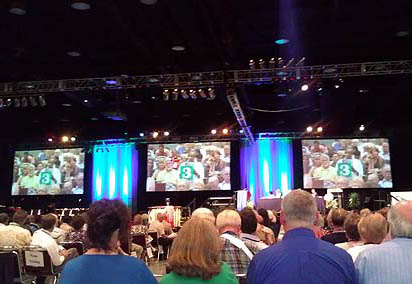Tags
(This post is by A.J. Nolte, a Washington, D.C. Anglican writer with a Ph.D. in world politics from Catholic University. He graduated from and has been an adjunct professor at Messiah College.)..
The current controversy over admitting Syrian refugees into the country raises some very challenging questions for Evangelical Christians. On the one hand, for all the trite ways in which many verses about loving your neighbor and protecting the stranger have been used in this recent debate, there is, and rightly ought to be, a very real humanitarian streak in Evangelical foreign policy. On the other, many politicians often trusted by and associated with Evangelicals, Republicans in particular, have shown a deep and immediate skepticism to accepting refugees, with the support of what appears to be a majority of the public. President Obama’s hectoring and rather self-righteous tone, seemingly designed to alienate more than to persuade, has doubtless played its own role in current Evangelical ambivalence. Evangelicals have many reasons to be ambivalent, for both Republicans and the President have handled recent events poorly.
Christians can, and should, take pride in the active role played by organizations affiliated with our faith in refugee resettlement. There is a humanitarian duty for Christians to act—particularly given the way our brothers and sisters in Christ have been driven out of their homes by this crisis—and we ought not to shrink away from that duty. It is difficult to attribute much current, knee-jerk reaction against refugees to any source but fear. Both a Christian sensibility and the evidence of history suggest that policies based primarily on fear, particularly policies adopted quickly and in the face of tragedy, are rarely wise. I’m reminded of the post-Newtown gun control legislation rushed through the New York state house and senate that conspicuously forgot to exempt police. Recent ridiculous and unconstitutional comments by Donald Trump about establishing a database of Muslims [later disavowed] illustrate the dangers of crafting policy on the fly, and in response to public fear. Finally, the response is foolish on pragmatic grounds. As Walter Russell Mead and Noah Rothman have argued, the refugee issue has been cynically manipulated by the Obama administration to distract attention from the failure of our policy with respect to ISIS (more on which below). Every moment Republicans spend talking about refugees is a moment in which they are playing into the politics of division and distraction, and are failing to address the role our failed policies have played in causing the crisis in the first place. Thus, even if they succeed in blocking the President’s policies, Republicans are allowing him to play the aggrieved martyr constrained by xenophobia, rather than admit to and grapple with his own profound policy failures.
Nonetheless there are a few grave concerns Christians ought to express regarding the Administration’s refugee plans. First, there is the question of screening. The refugee and asylum-seeker screening process is arduous, and evaluates claims on a case by case basis. While the number of refugees the administration plans to admit is fairly small, the stated desire to circumvent the normal refugee process is a bit concerning. Indeed, a policy of more refugees and better screening might be preferable to the Administration’s current approach. Additionally, in light of other recent government failures from the VA scandal to the OPM hack, vague assurances that things are under control do not seem credible. Christians are not uncompassionate for seeking a policy that is both humane and reasonably secure.
Two other issues are particularly salient to Christians: the character of the refugees and that of the organizations that provide services to them. Nina Shea and others have thoroughly documented the persecution of religious minorities not only in their country of origin, but in the UN camps in neighboring countries and Europe. Calls to accept only Christian refugees are unwarranted, and would unfairly exclude other religious minorities, such as Alawites and Yazidis, who face equivalent persecution. Yet some provision should be made to give preference to members of persecuted minorities. Contrary to many ridiculous claims that this represents a “religious test,” such a policy is entirely in keeping with past refugee policy, notably the emigration of Russian Jews under the 1970s-era Jackson-Vanik Amendment. The appointment of Knox Thames, a veteran of the U.S. Commission on International Religious Freedom, as a State Department Special Advisor for religious minorities in the Near East and South-Central Asia, is a good start, but as Shea reports, the number of Christians and Yazidis admitted since the conflict began is in double digits; this must change.
One issue that has not been discussed is the character of organizations that aid refugees, a majority of which are faith-based. The Obama Administration’s track record of respect for faith-based charitable organizations is poor, to say the least. Even when such organizations are coping with crises such as providing services to victims of human trafficking and unaccompanied minors crossing the border religious organizations have been penalized for acting according to their religious conscience. Faith-based organizations should receive some assurance from the Obama Administration that the President’s other ideological goals will not take precedent over the provision of services to refugees.
Finally, it is essential that all of us, Christian and non-Christian alike, return to the central underlying issue: our failed strategy against ISIS. We must recognize that, without the destruction of ISIS, a political solution in Syria and Iraq is impossible, and hence, the refugee crisis, as well as the broader crisis of annihilation faced by our brothers and sisters in these countries, cannot be resolved. We must also recognize that our current anti-ISIS strategy has demonstrably failed. It is long past time for a reappraisal of this strategy, the flawed assumptions underpinning it, and the necessary strategic changes we must make if ISIS is to be defeated. This reappraisal will be the subject of my next post.



You must be logged in to post a comment.